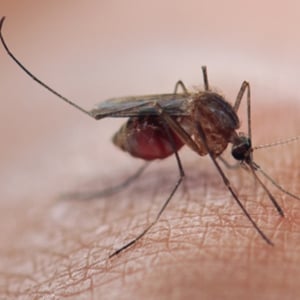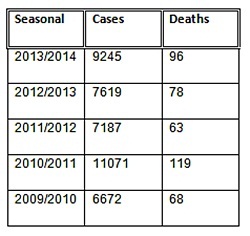
Travellers are being urged to take precaution during the holiday season to guard themselves against malaria.
South Africa has recorded a rise in malaria-related deaths, warned the National Institute for Communicable Diseases.
The institute noted an usual seasonal increase in malaria since October 2014. "Of concern is the rise in the number of cases infected within South Africa over the past 2 years and the increase in malaria-related deaths, largely because of missed diagnosis and delayed treatment."
Ninety six people died of the disease in the last season, compared to seventy eight in the previous period.
Below are the cases for the past 5 malaria seasons in South Africa:
Read: Malaria: things you should know
"Travellers over the festive season need to take precautions when travelling to malaria areas within the three provinces of KwaZulu-Natal, Limpopo and Mpumalanga, and to other countries in the region, particularly Mozambique.
The risk of contracting malaria can be reduced by using mosquito repellents and preventive medication is also strongly advised when visiting high risk areas, especially outside the country.
"Travellers returning from high-risk areas must maintain a high awareness for malaria if they develop a fever or flu-like illness, and this should prompt urgent testing, and treatment if necessary."
Symptoms of malaria include chills, sweats, feelings of weakness, lethargy and dizziness, muscular, body and abdominal pains, headaches, nausea and diarrhoea.
Read: South Africa makes great progress in malaria control
These can appear from a week to two weeks after being bitten by a malaria-carrying mosquito. However, Dr Vincent Pete Vincent of Netcare Travel Clinics and Tokai Medicross Family Medical and Dental Centre advised that people should remain vigilant for some months after they return home.
“Regard any fever as malaria until it is proven otherwise,” said Dr Vincent, who was speaking on the eve of the Southern African Development Community (SADC) Malaria Day, which was on 8 November.
Prevention is key when it comes to malaria but the disease can also be cured with a diagnosis and treatment.
Read: How malaria is treated
In South Africa, treatment is usually with either an artemesinin derivative called artemether in combination with lumefantrine (Coartem), or with quinine combined with doxycycline.
The artemether/lumefantrine combination has been used since 2001 in Kwazulu Natal with good results. It can be used for uncomplicated malaria if the patient is able to take medication orally.
For severe or complicated malaria, quinine given intravenously is still the recommended treatment in South Africa.
Also read:
Why mozzies love you and how to repel them
New test fast-tracks malaria diagnosis
Global warming could push malaria to higher areas




 Publications
Publications
 Partners
Partners











